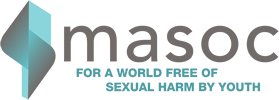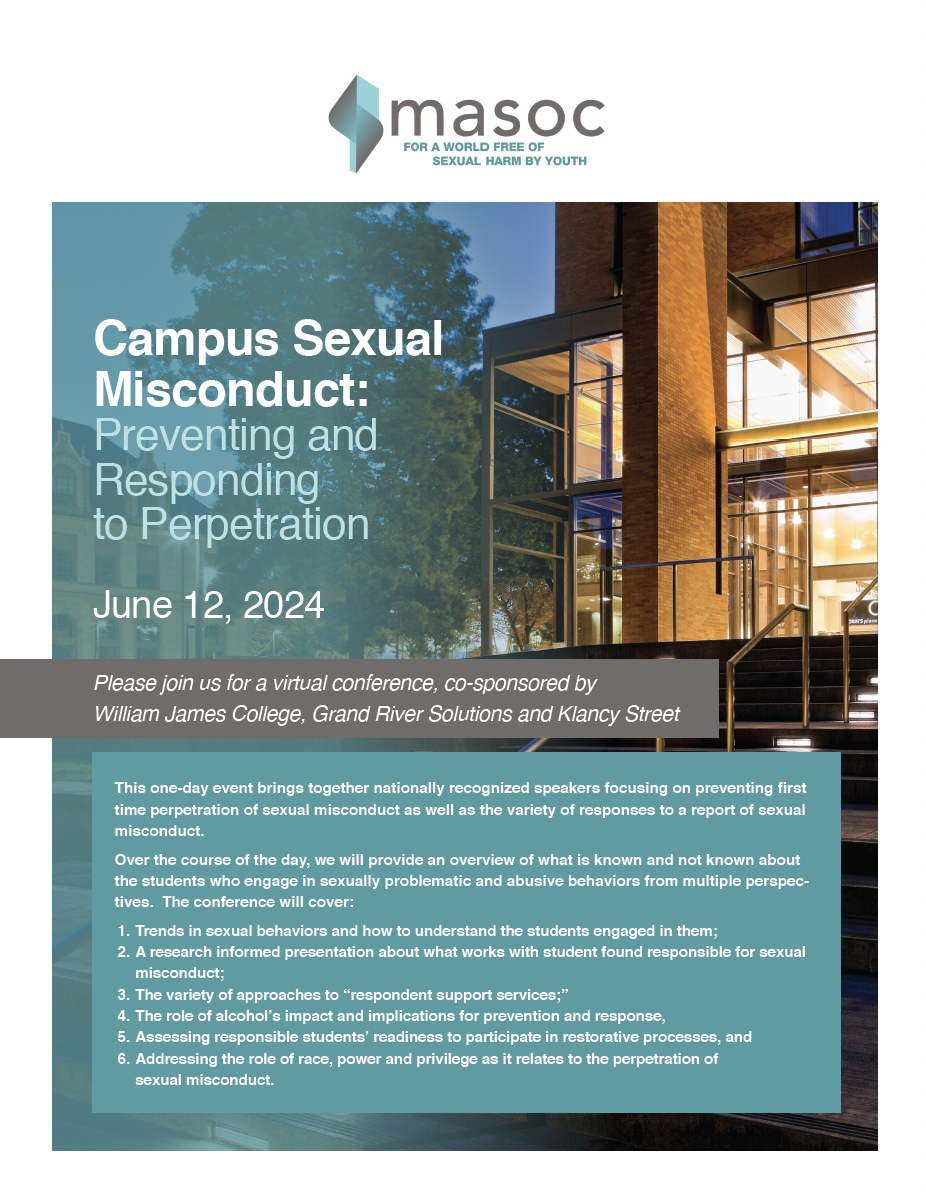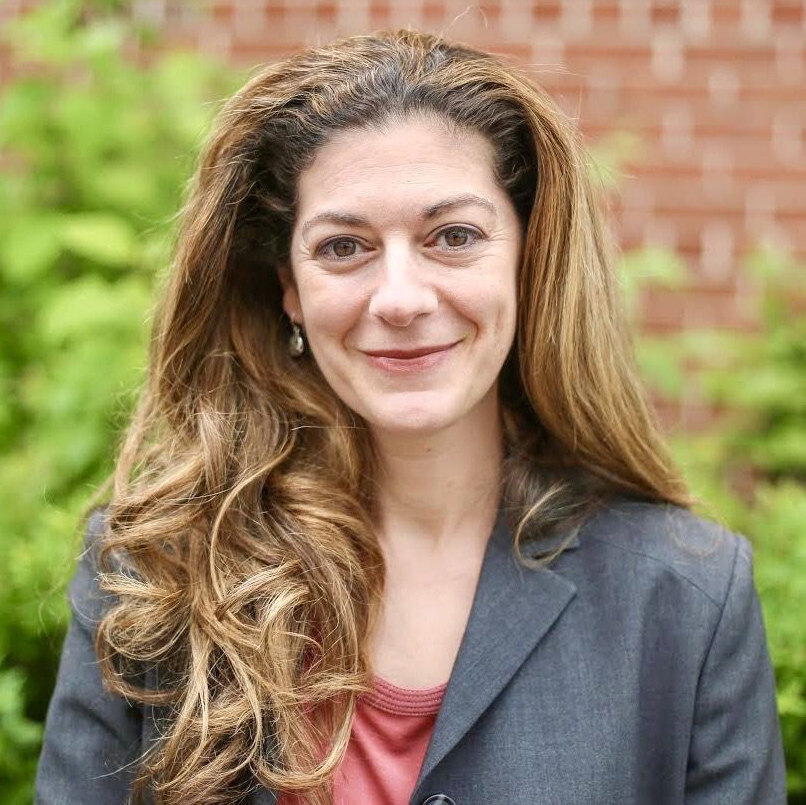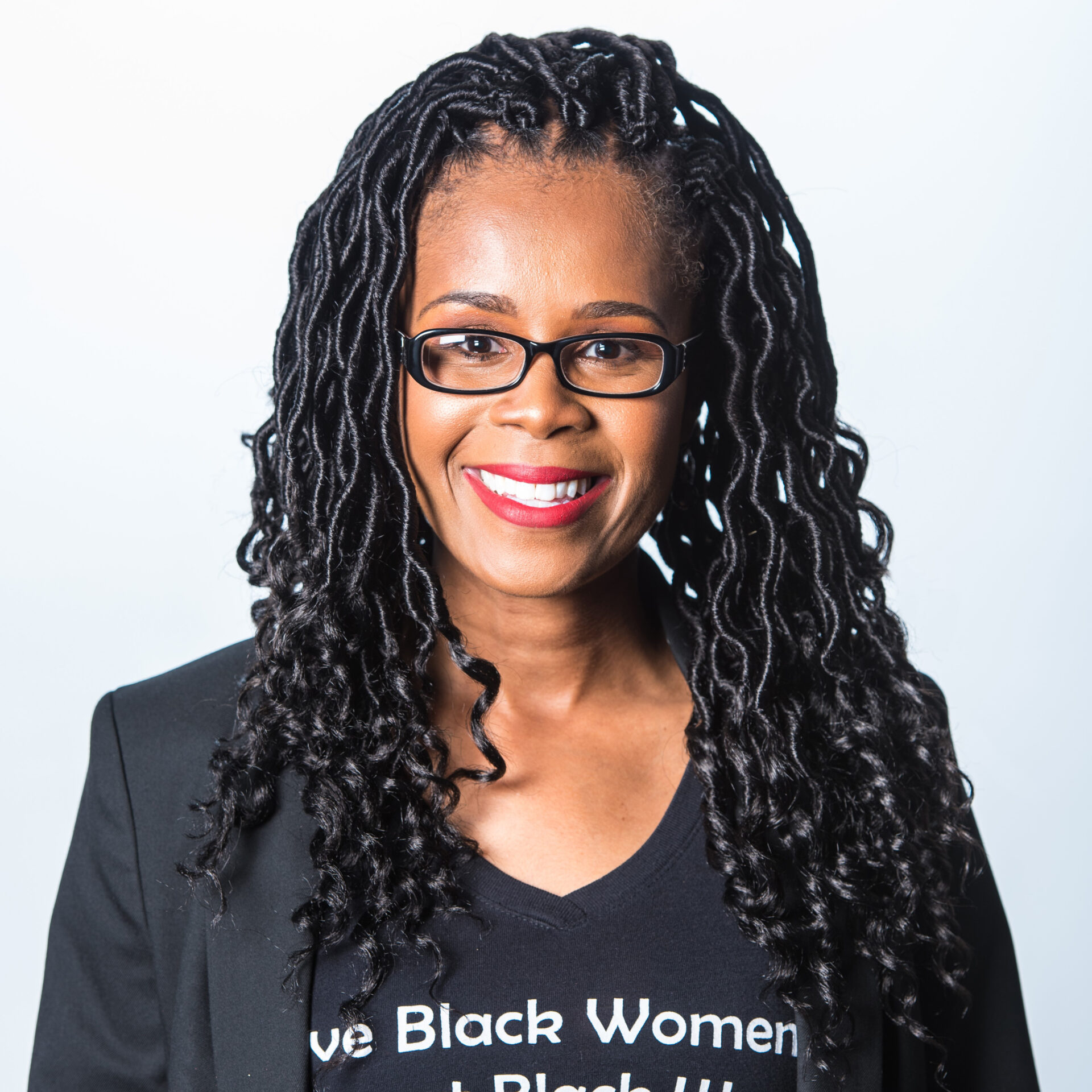Campus Sexual Misconduct Conference
Register now for MASOC’s 4th annual Campus Conference, a virtual event on June 12, 2024. This is the only conference in the United States with a specific focus on preventing and responding to the wide range of sexually problematic behaviors in the college and university setting.
2024 MASOC Campus Conference
Preventing and Responding to the Perpetration of Sexual Misconduct
June 12, 2024 | Virtual Event | $98
This one-day event brings together nationally-recognized speakers focusing on preventing first time perpetration of sexual misconduct as well as the variety of responses to a report of sexual misconduct. Over the course of the day, we will provide an overview of what is known and not known about the students who engage in sexually problematic and abusive behaviors from multiple perspectives.
William James College will award 5 Continuing Education Credits for Psychologists, Licensed Mental Health Counselors, Licensed Marriage and Family Therapists (LMFTs in MA) and NBCC/LPCs for attending the full day. Application for social work CE credits has been submitted. Please note that there may be a slight variance in the number of CE credits approved for each discipline by the relevant authorizing board.
View the full agenda below, see speaker bios, or download the conference brochure.
Our Sponsors
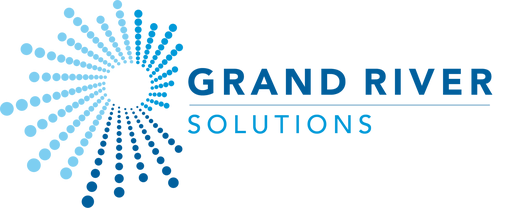

What We’ll Cover
- Trends in sexual behaviors and how to understand the students engaged in them;
- A research informed presentation about what works with student found responsible for sexual misconduct;
- The variety of approaches to “respondent support services;”
- The role of alcohol’s impact and implications for prevention and response,
- Assessing responsible students’ readiness to participate in restorative processes, and
- Addressing the role of race, power and privilege as it relates to the perpetration of sexual misconduct.
Keynote Speaker
Rough Sex and Choking/Strangulation: Updates from College Student and US Nationally Representative Surveys
Debby Herbenick, Ph.D., MPH
Readily available and aggressively marketed online, exposure to hardcore pornography is now mainstream. Porn has become the default sexuality educator for many young people. But mainstream pornography conveys deeply problematic messages – about consent, pleasure, men, women, power and aggression. Pornography is shaping young people’s sexual understandings, expectations and experiences, with concerning implications for their capacity to navigate a sexuality that is safe, respectful, mutual and consenting. There is growing concern internationally that pornography is contributing to cultural conditions that cultivate sexual assault. Understanding and addressing the influence of pornography is critical for sexual violence prevention. Drawing on international research and on the presenter’s interviews with young people, experts and porn industry professionals, this session will provide an overview of the issues and introduce some practical tools and resources developed in Australia to proactively address pornography’s influence.
Keynote Speaker
Responding to Sexual Misconduct: Focusing on What Works
David Prescott, LICSW
This presentation picks up where recent research and practices have left off. It essentially asks: Given that we all want to end sexual violence, what can we do with the knowledge and resources we have? The presentation begins with a discussion of the previous keynote address and its implications. It then provides an overview of the effective ingredients of intervention, from the importance of individualized assessment to the principles of evidence-based approaches to harm. It explores the nature of motivations underlying sexually harmful behaviors. Finally, it offers reasons for optimism and confidence that each professional can make a difference in preventing and responding to sexually harmful behaviors in the campus setting.
Workshop Series 1
What Do We Mean When We Say “Respondent Support Services?” – Exploring the Field and Imagining the Future
Jay Wilgus, JD, MDR & Kyla V Martin, MS
The field of Respondent Support Services began to take shape following issuance of the 2011 Dear Colleague Letter and then again following the 2020 Title IX changes, which required equitable treatment of complainants and respondents within grievance processes. In 2024, most campuses have developed specially designed services for victims and survivors of sexual violence. However, only recently have campuses begun to develop services dedicated to individuals concerned with their own behaviors or who have been accused of, or found responsible for, causing sexual harm. A relatively new field has emerged which lacks clear guidance and which operates outside a designated professional home or association. This session explores the functional areas of Respondent Support Services, what existing resources it offers, and begins imagining a future with greater clarity, shape, and structure.
Understanding Alcohol’s Role in Sexual Violence on College Campuses: Implications for Prevention & Response
Nichole M. Scaglione, Ph.D., CHES
Alcohol is involved in roughly 70% of campus sexual assaults, highlighting a unique need and opportunity to integrate alcohol and sexual violence prevention efforts. This interactive workshop will provide an overview of alcohol’s physiological and psychosocial impacts on sexual violence victimization, revictimization, perpetration, and bystander intervention. We will evaluate evidence-based prevention approaches that have been used to reduce and respond to alcohol misuse and sexual violence at the individual, interpersonal, and community levels of the social ecology, and discuss the challenges associated with translating evidence-based approaches into practice on college campuses.
Workshop Series 2
Restorative Responses to Sexual Harm on Campus: Assessing Responsible Student Readiness
Rachel King, Ph.D. & Toni McMurphy, M.A.
Offering college students restorative justice as a resolution pathway in response to sexual harm supports healing and accountability, but it is not the right option in every circumstance. This session will discuss what makes a restorative resolution process “appropriate” and positioned to meet the needs of involved students and their institutions. Facilitated by experienced restorative justice practitioners, this workshop focuses specifically on how to assess the readiness for participation of a student who caused harm. Drawing on real cases, essential elements for analysis, such as safety, involved party needs, risk of revictimization, and confidentiality will be discussed. The session examines key considerations such as facilitator selection, the role of advisors/support persons, recordkeeping, and community representation, and reviews concrete strategies for supporting responsible students in achieving effective participation before, during, and after a facilitated restorative process.
The Privilege is Not Ours: Addressing the Role of Race, Power & Privilege in Our Work
Tyffani Monford Dent, Psy.D.
Within recent years, there has been a brighter light shone on the idea of racism, privilege, and their impact on mental health, carceral system involvement, educational systems, and overall quality of life. However, within our work with adolescents and young adults with problematic decision-making where there is usually an intersection of all of those areas, we have often failed to take into account how race, power, and privilege impact our students and what interventions may look like. During this presentation, we will explore how racism determines where we see our students and their involvement in systems, how their cultural identification may show up within education and intervention around issues of engagement and need, and the work we need to do to challenge how our own privileges show up.
Learning Opportunities
MASOC offers numerous training opportunities through conferences, webinars and a lunch-and-learn series. View all opportunities.
